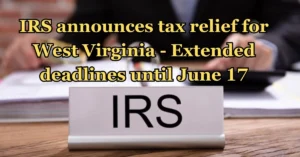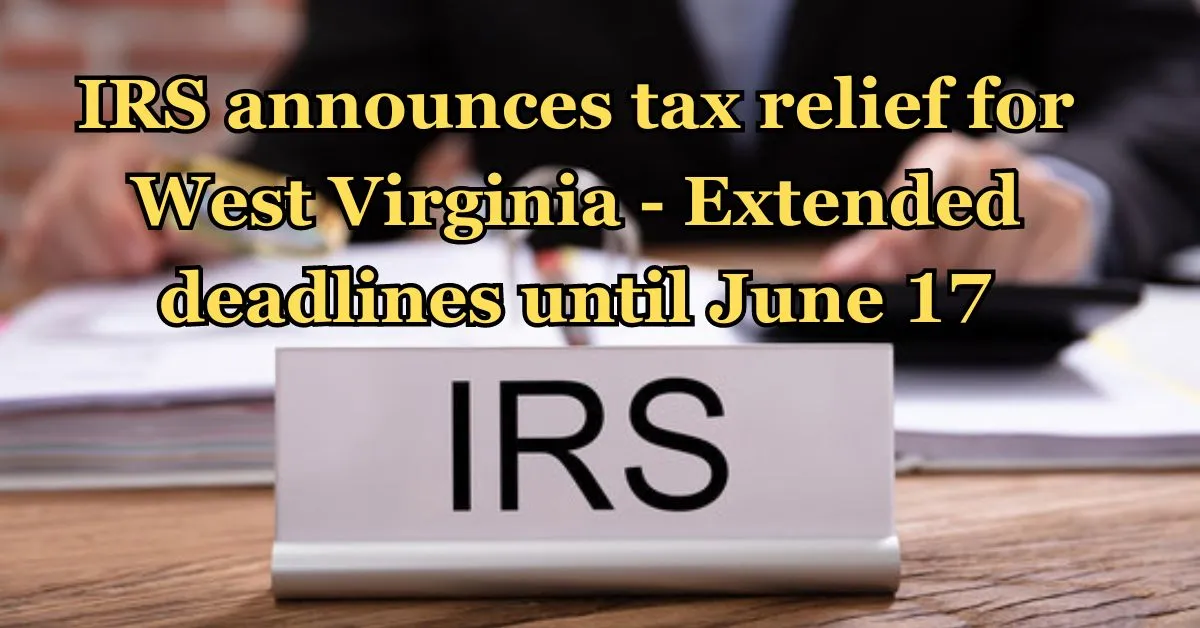In a decisive move, the Internal Revenue Service (IRS) has announced crucial tax relief for individuals and businesses in West Virginia, severely impacted by storms, flooding, landslides, and mudslides commencing on August 28, 2023. This comprehensive guide delves into the IRS’s multifaceted relief measures, outlining how extended deadlines, eligibility criteria, and various relief options aim to alleviate the financial burden on West Virginians. Discover more by reading the full article, providing comprehensive information on the IRS announces tax relief for West Virginia with extended deadlines until June 17.

Extended Deadlines: A Lifeline until June 17, 2024
In recognition of the challenges faced by those grappling with the aftermath of natural disasters, the IRS has extended filing and payment deadlines until June 17, 2024. This extension serves as a lifeline, providing essential breathing room for individuals and businesses navigating the complexities of recovery.
Eligibility Criteria: Designated Areas and Qualifying Taxpayers
The IRS relief is targeted and not blanket, focusing on areas designated by the Federal Emergency Management Agency (FEMA). Currently encompassing Boone, Calhoun, Clay, Harrison, and Kanawha counties, residents and businesses in these locales automatically qualify for the IRS tax relief, ensuring that aid reaches those who need it most.
Expansive Relief Coverage: Impacted Tax Obligations
The relief extends across a spectrum of tax obligations originally due between August 28, 2023, and June 17, 2024. This includes a range of deadlines such as individual income tax returns, contributions to IRAs and health savings accounts, quarterly estimated income tax payments, and other crucial tax obligations.
Specific Deadlines Affected by the Relief: A Detailed Breakdown
- Individual income tax returns and payments (normally due on April 15, 2024)
- 2023 contributions to IRAs and health savings accounts
- Quarterly estimated income tax payments (normally due on Sept. 15, 2023, Jan. 16, 2024, and April 15, 2024)
- Quarterly payroll and excise tax returns (normally due on Oct. 31, 2023, Jan. 31, 2024, and April 30, 2024)
- Calendar-year partnership and S corporations (with a valid tax-year 2022 extension)
- Calendar-year corporations and fiduciaries (with a valid tax-year 2022 extension)
- Calendar-year tax-exempt organizations (with a valid tax-year 2022 extension)
Penalty Abatements: A Reprieve for Timely Deposits
Penalties for failing to make timely payroll and excise tax deposits between Aug. 28, 2023, and Sept. 12, 2023, will be abated if deposits were made by Sept. 12, 2023. This initiative aims to ease the financial strain on businesses that faced challenges meeting deposit deadlines during the critical period.
Seamless Relief Process: Automatic Assistance and Addressing Unique Circumstances
The IRS has streamlined the relief process by automatically providing assistance to any taxpayer with an IRS address in the disaster area. For those without an IRS address of record in the area, the IRS encourages direct communication for penalty abatement. Moreover, the IRS extends support to taxpayers living outside the disaster area but facing challenges due to records being in the affected region.
Filing Extension Beyond June 17: Electronic Requests Encouraged
Taxpayers requiring an extension beyond June 17 for their 2023 federal income tax return are advised to request it electronically by April 15. Although extensions during this period can only be submitted on paper, they grant until Oct. 15, 2024, to file. Visit IRS.gov/extensions for detailed information.
Uninsured or Unreimbursed Losses: Flexible Claim Options
Individuals and businesses in the disaster area with uninsured or unreimbursed disaster-related losses can opt to claim them on either the return for the year the loss occurred (2023) or the prior year (2022). The election window extends up to six months after the due date of the federal income tax return for the disaster year.
Qualified Disaster Relief Payments: Exclusion from Gross Income
Qualified disaster relief payments are generally excluded from gross income, providing a financial cushion for affected taxpayers. This includes amounts received for personal, family, living, or funeral expenses, as well as for home repair or rehabilitation. Refer to Publication 525, Taxable and Nontaxable Income, for detailed information.
Additional Relief for Retirement Plans and IRAs: Addressing Financial Strain
Taxpayers participating in retirement plans or individual retirement arrangements (IRAs) may be eligible for special disaster distributions and hardship withdrawals, each with specific rules and guidance. Each plan or IRA has unique provisions to aid participants facing financial strain due to the disaster.
Conclusion: IRS announces tax relief for West Virginia
The IRS’s unwavering commitment to West Virginia’s recovery is evident in the comprehensive tax relief initiative. This coordinated federal response, guided by local assessments from FEMA, aims to provide financial stability and support to individuals and businesses affected by the devastating natural disasters. Stay informed about the latest updates on disaster recovery by visiting DisasterAssistance.gov.
FAQs: IRS Tax Relief for West Virginia
How does the extension of deadlines benefit West Virginians?
The IRS has extended filing and payment deadlines until June 17, 2024, offering a crucial lifeline for those navigating the complexities of recovery.
Which areas qualify for IRS relief in West Virginia?
IRS relief is designated for specific areas, including Boone, Calhoun, Clay, Harrison, and Kanawha counties, as determined by FEMA.
What tax obligations are covered by the relief?
The relief spans various tax obligations due between August 28, 2023, and June 17, 2024, including income tax returns, contributions to IRAs, quarterly payments, and more.
How does the IRS address penalty abatement for timely deposits?
Penalties for failing to make timely deposits between Aug. 28, 2023, and Sept. 12, 2023, will be abated if deposits were made by Sept. 12, 2023, alleviating financial strain on businesses.
Kindly visit our website as well Stimuluscheckupdates.com

